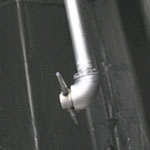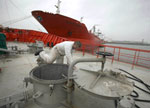Shipment with double safety nets
Safety is key when you’re entrusted with the responsibility of transporting chemicals. For chemical tanker company Vopak safe and fast tank cleaning systems are one of the vital elements.
DATE 2023-11-28Vopak Shipping B.V., a subsidiary of chemical storage company Royal Vopak, operates a fleet of 14 state-of-the-art sea-going chemical carriers. Decked out in bright orange, sometimes with blue trimmings, they are a familiar sight in Rotterdam harbour, Europe’s leading harbour. The highly specialised vessels are capable of simultaneous loading and discharging of up to 22 different chemical products.
“Most of our carriers have a double deck and all have a double hull and double bottom, all stainless steel, in accordance with the latest International Marine Organisation specifications,” says Captain Rob Krootjes, Vopak Shipping’s fleet manager. “The double hull provides added security for our cargoes, while the double deck covers the cargo transfer lines and acts as insulation for the cargo.”
Each chemical product has particular requirements for safe transportation, according to Krootjes, who started his career as a captain on vessels operated by Smit International, a salvage company. “Some cargoes have to be transported at a constant temperature, regardless of the climate we’re sailing through. And ‘green water’, or waves over the decks, could also influence the temperature of the cargo if it were not insulated.”
Increased awareness
The EC has adopted a number of measures to regulate the production and transport of difficult chemicals. “With both government and public awareness considerably increased in recent years, the transport of chemical is a demanding sector in which to operate,” says Karel Vinke, Vopak Shipping’s cargo superintendent, who started his career as a second officer on chemical vessels in the fleet owned by Gebroeders Broere, the company out of which Vopak Shipping was formed.
“September 11, 2001, when the World Trade Center in New York was attacked, was a real watershed for shipping as well,” adds Krootjes. “A new international agreement on maritime safety, the International Ship and Port Facility Security Code (ISPS), will come into force in July 2004. We’re working hard on writing safety manuals and developing training programmes. Safety is a matter of thinking clearly. As we say, safety is between the ears.”
“Because we’re dealing with substances which are difficult to transport, the quality of our officers and crew is very important to us, so we invest a lot in them,” Krootjes continues. “We have an old-fashioned relationship with our crews. The vast majority of them, both officers and other crew members , stay with us for a long time, some for all of their careers.”
Two-stage cleaning process
The process of cleaning the tanks in Vopak’s chemical carriers is also important for both safety and efficiency, says Vinke. “One of the most vital elements in cleaning is to ensure that there is no cross-contamination from one cargo to another. For instance, you absolutely cannot have cross-contamination if you’re carrying acetic acid after a shipment of hydrocarbons, because acetic acid is often used in the preparation of consumables.”
Hexamethylene diamine, for instance, must be kept at a constant temperature of around 55°C, and it must also be prevented from coming into contact with either water or oxygen. Propylene oxide must be insulated with a layer or “blanket” of nitrogen to prevent it from coming into contact with oxygen, while a substance like styrene monomer requires oxygen. “Still, these are the challenges of our business,” says Krootjes.
 The cleaning process occurs in two stages, the first using sea water and the second using fresh water. This helps to cut costs, Krootjes admits with a practical shrug: “Fresh water costs around €5 per tonne.” The fresh water stage is necessary to ensure that no salts from the seawater are left in the tank to react with the new cargo after cleaning. After some cargoes, such as monoethylene glycol (used in anti-freeze and resins), demineralised water must be used to clean the tank.
The cleaning process occurs in two stages, the first using sea water and the second using fresh water. This helps to cut costs, Krootjes admits with a practical shrug: “Fresh water costs around €5 per tonne.” The fresh water stage is necessary to ensure that no salts from the seawater are left in the tank to react with the new cargo after cleaning. After some cargoes, such as monoethylene glycol (used in anti-freeze and resins), demineralised water must be used to clean the tank.
“You could say that each chemical carrier is an advanced, mobile chemical storage facility,” says René Elgaard, sales director of Alfa Laval Tank Equipment, which makes the cleaning equipment used on Vopak Shipping’s vessels. “Our cleaning systems with rotary jet heads clean the complete cargo tanks fast and effectively. We work with Vopak on identifying the ‘shadows’, or the parts of the tank that would otherwise be inaccessible. Our systems are also fast and economical with regard to water and detergents, so that our customers incur lower cleaning costs and less downtime over the long term.”
Striking illustration
Elgaard and Vinke bring in one of the ship models, which are displayed in glass cases in the company’s foyer. “Careful now,” says Krootjes. “Those models are insured for nearly €16,000 each.”
It’s not hard to see why. The model, in this case of the Dutch Spirit, which is 6 years old, is so intricate and beautifully made that it might almost be a real ship, magically shrunk in size. “There you have the manifold,” says Vinke, pointing to a complicated box-like structure in the middle of the ship, from which there are many pipes running, some into the hold containing the vessel’s chemical tanks, some along the vessel’s deck, and some to the high bridge aft.
“On chemical carriers, transfer of cargo, tank cleaning, and tank stripping are all controlled through the manifold,” Krootjes continues. “All tanking is fully enclosed,” adds Vinke. “That means that no cargo ever comes into contact with the outside environment.”
“Everything above decks is handled by the ship’s crew, while everything below decks is handled by the engineers,” says Elgaard.
The three men, two seamen with extensive experience in handling chemical cargoes and a salesperson with an engineering background, look intently at the model. The Dutch Spirit may be a ship, but the central manifold on her deck is the heart of their difficult business. And without ships like this, consumers around the world would not have the benefit of products as different as fishing lines, nail polish and bullet-proof vests.
Alfa Laval / Vopak cooperation
Vopak Shipping has been working in close co-operation with Gunclean Toftejorg, now Alfa Laval Tank Equipment, for 25 years on developing efficient tank cleaning systems for its chemical carriers.
René Elgaard, a sales and marketing director with Alfa Laval and Karel Vinke, Vopak Shipping’s cargo superintendent, have been working closely with each other for the last eight years.
Their working relationship started when Vinke went to Denmark to visit the Toftejorg factory in Denmark. “We needed cleaning machines for 11 vessels at the time,” says Vinke. “At 2 machines per tank, with one of the ships needing 44 machines, that came to quite a lot of business, as you can imagine.”
"Vopak Shipping and Alfa Laval work together on a long-term basis because that’s the best guarantee of quality in a demanding and competitive industry,” says Vinke. “We have long-term contracts with a number of our own clients, among them BP, Dow and Huntsmann. That means we have to be able to guarantee quality in the long-term. So Alfa Laval is crucial in helping us to guarantee quality to our customers.”
A good relationship creates a sustained quality service, Elgaard agrees. ‘However, this doesn’t mean that we can settle into a comfort zone with Vopak Shipping. We still have to compete with other companies in the tendering process, which means we have to look at our costs very carefully.’
“Being part of Alfa Laval has given us the advantage of bigger networks to operate in and will enable us to offer more integrated systems to clients like Vopak Shipping,” says Elgaard. “The integration concept my focus now. The marine industry as a whole is healthily conservative. People don’t just adopt the latest developments because they’re new. They have to be convinced that the solutions they’re being offered are better and right for them. That’s what I do with Karel, aside from working in detail on Vopak’s tank cleaning systems.”
His relationship with Vinke is an advantage, he adds. “We get on well on a personal level, which means that we can speak frankly and openly with each other.”

